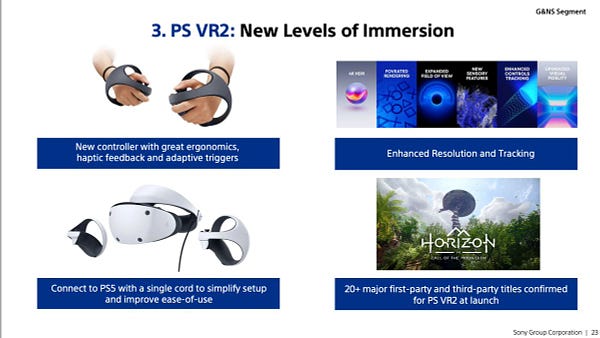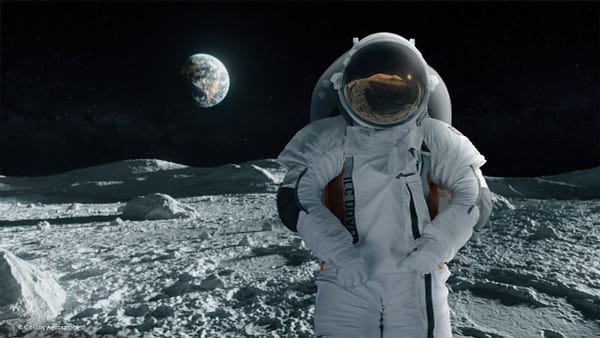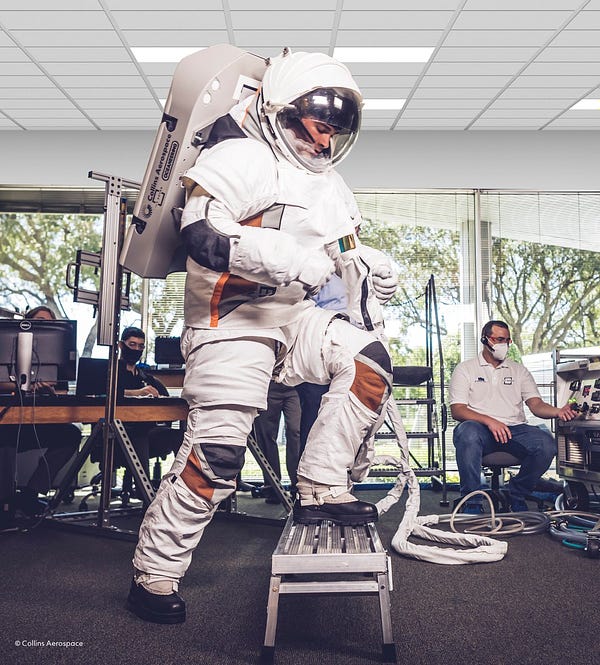👽 Police VR Training
Hey there, I'm Emil Protalinski and this is FiToSci, a weekly newsletter that tracks how humanity is taking the fiction out of science fiction.
Due to the recent long weekend, this edition spans two weeks of content across:
👓 AR/VR: Police VR training, PSVR2, and better AR glasses
🧬 Biotech: 3D-printing, transplanting, and gene editing
🤖 AI/robots: Household chores, navigation, and deepfakes
🚀 Space: Spacesuits, satellite captures, and solar sails
🚗 Transportation/logistics: Drones and drone swarms
Quote of the week
"If I send you a text on WhatsApp, it’s text, right? It might terrorize you but to a certain degree it will not create the memories that you will have PTSD (post-traumatic stress disorder) from it. But if I come into the metaverse and it’s a realistic world that we’re talking about in the future and I actually murder you, and you see it ... it actually takes you to a certain extreme where you need to enforce aggressively across the world because everyone agrees that certain things are unacceptable." — UAE's AI minister Omar Sultan Al Olama, arguing we need new laws to prevent people from committing crimes such as "murder" in the metaverse.
News
👓 Axon launched its VR simulator for training law enforcement officers in de-escalation tactics using the company's taser weapons and replica training firearms. Instructors can even host sessions remotely with their students regardless of their physical locations. The system is built on HTC's Vive Focus 3 and Vive Wrist Trackers, which track the position of the user's hands in VR. If you're getting a sense of déjà vu, that's because Axon announced the wireless VR simulator in May 2021, and now it's finally available.


👓 Sony revealed that its PlayStation VR2 (PSVR2) headset for the PS5 will launch with more than 20 games. The PSVR2 still doesn't have a launch date, but the latest speculation (see the Twitter thread above) centers around Q1 2023.
👓 TriLite partnered with Dispelix to create an ultra-compact display system that would make AR possible "in every pair of glasses, regardless of size or style." I'll believe it when I see it, no pun intended.
👓🧬 Meta unveiled MyoSuite, a platform aimed at modeling complex human movement (allegedly 4,000 times faster than existing musculoskeletal modeling software) to help develop prosthetics, physical rehab, and surgery techniques, plus potentially metaverse avatars. If the company considered the first three more important than the fourth, it would have rebranded itself as Physio.
🧬 3DBio Therapeutics completed the first ear reconstruction using a 3D-bioprinted ear implant grown from the patient's own living cells, an approach that could lead to tissue implants for treating traumatic injuries, reconstructive and regenerative therapy, and possibly even biomanufacturing whole organs. My dad always told me not to listen to music too loudly because the ear can't be regenerated — thanks for proving him wrong, technology!
🧬 Engineers developed a 3D-printing method that uses light to make objects out of opaque resin in a matter of seconds rather than minutes, which could be useful in biomedical applications like making artificial arteries. But first, they created a tiny Yoda figurine in 20 seconds.
🧬 Researchers shared that their patient, who received a human liver that was considered too damaged for transplant but was repaired for three days outside of the body using machine perfusion, remains healthy one year after surgery. The technique could increase the number of livers and other organs available for transplantation and allow scheduling surgery days in advance, assuming obscenely rich alcoholics don't get their hands on it first.
🧬 Scientists developed CRISPR-Combo, a method to edit multiple genes in plants while simultaneously changing the expression of other genes, allowing for an unlimited combination of traits and a new sophistication of genetic engineering in crops. I'm on board if and only if they don't splice in any human traits.
🧬 Researchers gene-edited tomatoes to produce vitamin D in both the fruit and the leaves by turning off a specific enzyme in the plant's genome and exposing it to UVB light. The first CRISPR-edited food, also a tomato, went on sale in November 2021.
🧬🤖 Scientists created a bioreactor to grow cells on the shoulder joint of a robot skeleton meant to approximate the human musculoskeletal system. Although the team isn't sure whether this tissue growing technique is an improvement over traditional methods, I'm still happy they started with the shoulder and not the head.
🧬🤖 Researchers created a "millirobot" with a flexible body and spiky feet that can climb along the slippery inner walls of the lungs and the gut, where they could one day deliver drugs and medical sensors in hard-to-reach places. For those afraid of needles, is a robot in your body better or worse?
🤖 Dyson revealed a "big bet" on producing robots capable of household chores by 2030, featuring attachments such as a hand with soft graspers and a vacuum, of course. I would be okay with Dyson creating Rosie the robot maid from The Jetsons.
🤖 Engineers developed a low cost, low power technology that uses Wi-Fi signals to help robots accurately map their way indoors, even in poor lighting and without recognizable landmarks or features. When the robot uprising is nigh, turn off the Wi-Fi.
🤖 Police created a deepfake video to appeal for information over the 2003 murder of a 13-year-old boy, calling the artificially manipulated footage a "world first" for an investigation. Since we can't stop deepfakes, I guess we might as well use them to solve murders.
🤖 Engineers developed the smallest remote-controlled walking robot (smaller than a flea at just a half-millimeter wide) that can bend, twist, crawl, walk, turn, and jump. While the tech could usher in micro-sized robots that can perform practical tasks inside tightly confined spaces, at least I know how to get rid of a flea.
🤖 Remy Robotics exited stealth and detailed its robotic kitchens that use smart ovens, fridges, and robotic arms to cook over 100 different recipes. Will we see a future where only the filthy rich frequent restaurants that have human-run kitchens?
🤖🚀 Lonestar shared its plans to use "lots of robots" to place datacenters in the moon's lava tubes, backing up the world's data using servers capable of holding 5PB in 2024 and 50PB by 2026. Hopefully by then we'll have internet on the moon.
🚀 NASA selected Axiom Space and Collins Aerospace to design next-generation spacesuits through 2034 for working outside the International Space Station, exploring the lunar surface, and preparing for human missions to Mars. The total value of the contracts is $3.5 billion, which I can safely say is higher than my wardrobe's lifetime budget.
🚀 ESA partnered with Astroscale on ELSA-M, the world's service spacecraft to remove several small telecommunications satellites from orbit in 2024 , so that OneWeb can launch more satellites. Humanity's approach of clearing just enough junk to produce more is well underway in space.
🚀🚗 NASA awarded the Diffractive Solar Sailing project, which imagines sails that use the pressure exerted by sunlight to propel a spacecraft, with $2 million over two years to continue development in preparation for a future demonstration mission. The idea has been discussed for decades and was first tested in a spacecraft in 2010, as humans continue to dream of sailing amongst the stars.
🚗 Flyability launched Elios 3, the world's first collision-tolerant drone equipped with a LiDAR sensor, plus a modular payload, the ability to create 3D models in real-time while flying, and a centimeter-accurate indoor positioning system. Elios 3 looks like it could survive a home run with a baseball bat.
🚗 Walmart announced plans to expand drone deliveries with DroneUp to cover 4 million U.S. households in 2022. Let's hope the screening process ensures the drones can't deliver anything that might blow up on impact.
🚗 Red Cat's Teal unveiled 4-Ship, the first and commercially available multi-drone swarm system, letting up to six Department of Defense-approved drones perform coordinated tasks under the control of a single pilot. If someone were to gift me a 4-Ship when it ships this fall, I would immediately use it to investigate Area 51.
Deals
🚀 SpaceX raised $1.5 billion.
🧬 Ultima Genomics raised $600 million.
👓 WIN Reality raised $45 million.
🤖 FarmWise raised $45 million.
👓 BUD raised $36.8 million.
🤖 Nomagic raised $22 million.
🚀 Astroforge raised $13 million.
🚀 Lunar Outpost raised $12 million.
👓 Tripp raised $11.2 million.
👓 Lynx raised $4 million.
Interviews
🤖 John Rogers talks micro-robots.
🧬 Brit Benjamin details artificial wombs.
🤖 Microsoft CTO Kevin Scott pitches AI regulation.
Thank you for reading FiToSci!
I've been watching The Expanse, so maybe that's why these latest updates about life beyond Earth caught my eye: a researcher estimated there are four "malicious extraterrestrial civilizations" in the Milky Way, a team predicted humans might be smart enough to accomplish interplanetary life within the next 200 years, and a professor proposed extraterrestrial civilizations may have used rogue planets to colonize new star systems.
Got feedback or a comment? You can reply to this email anytime and follow FiToSci on Twitter. If you know a friend or colleague who might enjoy this newsletter, point them to FiToSci.com.
See you next week!





